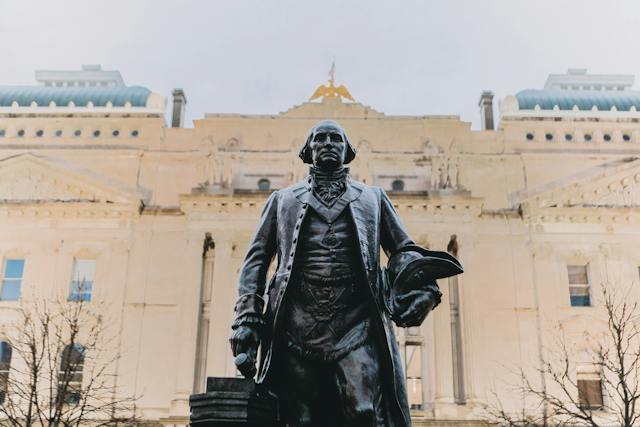
The American Revolutionary War, also known as the War of Independence, was a significant political and military conflict that took place between 1765 and 1783.
It was a pivotal moment in history when 13 of Britain’s North American colonies rejected British rule and established the United States of America.
This blog post will provide an in-depth overview of the Revolutionary War, including its major battles, key personalities, and the impact of democratic leadership during this revolutionary period.
5 Key Personalities in Revolutionary War
The Revolutionary War was shaped by the actions of key personalities who played pivotal roles in the conflict.
Some of the notable figures include:
- Read also: Unsung Heroes of the Revolutionary War
- Read also: John Jay in Revolutionary War
George Washington

George Washington, the commander-in-chief of the Continental Army, emerged as a central figure in the Revolutionary War.
His steadfast leadership and strategic acumen were pivotal in guiding the fledgling American forces through the challenges of the conflict.
Washington’s resilience during harsh winters, as seen in the iconic crossing of the Delaware River, became emblematic of the determination that fueled the American struggle for independence.
Thomas Jefferson

Thomas Jefferson, a Founding Father and the principal author of the Declaration of Independence, played a crucial role in articulating the ideals that inspired the American cause.
His eloquent expression of individual rights and the pursuit of happiness became foundational principles for the nation.
Beyond his role in drafting the declaration, Jefferson’s influence extended to shaping the nation’s early political landscape, as he later became the third President of the United States.
Marquis de Lafayette

Marquis de Lafayette, a French military officer, left a lasting impact on the Revolutionary War by fighting alongside the American forces.
His unwavering support and military prowess were instrumental in securing critical assistance from France.
Lafayette’s dedication to the cause of American independence showcased the international nature of the struggle and the alliances forged in pursuit of liberty.
King George III

King George III, reigning monarch of Great Britain during the Revolutionary War, played a central role in shaping British policies and decisions that influenced the course of the conflict.
His steadfast commitment to asserting British authority and quelling the American rebellion contributed to the tensions that eventually escalated into open hostilities.
King George III’s decisions had profound implications for both Britain and the American colonies.
John Adams

John Adams, a Founding Father and a key advocate for independence, played a multifaceted role in the Revolutionary War.
In addition to his diplomatic efforts, Adams served as a delegate to the Continental Congress, where he advocated for the declaration of independence.
His contributions extended beyond the battlefield, as Adams later became the second President of the United States, shaping the early governance of the newly formed nation.
These key personalities, among others, contributed to the shaping of the Revolutionary War and the eventual success of the American colonies in their quest for independence.
Major Battles and Campaigns
The Revolutionary War was marked by several major battles and campaigns that played a crucial role in shaping its outcome. Some of the key battles include:
Battle of Lexington and Concord (April 1775)
The opening shots of the Revolutionary War were fired in the Battle of Lexington and Concord.
Tensions between the American colonists and British authorities had been escalating, and this clash marked a pivotal moment.
British forces intended to seize colonial weapons in Concord but were met with resistance from local militias.
The skirmishes at Lexington and Concord became a spark that ignited the broader conflict.
Siege of Boston (April 1775 – March 1776)
Following the Battle of Bunker Hill, the Siege of Boston unfolded.
British forces found themselves surrounded by American militia, leading to a prolonged standoff.
The siege, marked by intermittent skirmishes and fortified positions, prompted the British to evacuate Boston in March 1776.
This campaign showcased the resilience of the American forces and their ability to maintain pressure on the British.
Battle of Saratoga (September – October 1777)
The Battle of Saratoga is regarded as a turning point in the Revolutionary War.
Fought in 1777, American forces, led by General Benedict Arnold and Major General Horatio Gates, surrounded and defeated the British army under General John Burgoyne.
The victory not only boosted American morale but also played a crucial role in securing foreign support, particularly from France.
This support proved instrumental in sustaining the American cause.
Surrender of Lord Cornwallis (October 1781)
The surrender of General Charles Cornwallis at Yorktown marked the conclusive chapter of the Revolutionary War.
Coordinated efforts by American and French forces, led by General George Washington and General Rochambeau, laid siege to Cornwallis’s army.
The British surrender at Yorktown in 1781 signaled the effective end of major hostilities.
The Treaty of Paris in 1783 formally recognized the independence of the United States, concluding the Revolutionary War.
These battles, among others, were instrumental in the eventual victory of the American colonies and the establishment of the United States as an independent nation.
Impact of Democratic Leadership
During the Revolutionary War, the principles of democratic leadership were evident in the collaborative and participatory approach adopted by American leaders and their forces.
The emphasis on shared decision-making, open communication, and the involvement of all ranks in the military hierarchy contributed to the resilience and determination of the American forces.
This democratic leadership style fostered a sense of unity, purpose, and shared responsibility, which were instrumental in sustaining the morale and commitment of the revolutionary army throughout the conflict.
- Read also: John Stark Revolutionary War
- Read also: Joseph Brant in the Revolutionary War
Conclusion
The American Revolutionary War was a defining chapter in the history of the United States, characterized by significant battles, the influence of key personalities, and the impact of democratic leadership on the outcome of the conflict.
The principles of democracy and collaborative leadership played a crucial role in shaping the resilience and success of the American forces during this revolutionary period.


